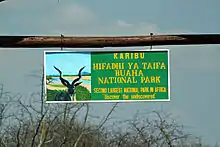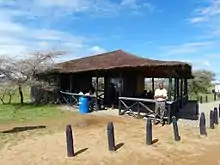Tanzania National Parks Authority
The Tanzania National Parks Authority commonly known as TANAPA is responsible for the management of Tanzania's national parks. TANAPA is a parastatal corporation and all its income is reinvested into the organization. It is governed by a number of instruments including the National Parks Act, Chapter 282 of the 2002 and the Wildlife Conservation Act No. 5 of 2009.[1] TANAPA manages the nation's 22 National parks which covers approximately 15% of the land area and has the mandate to conserve and manage the wildlife in Tanzania, and to enforce the related laws and regulations in this industry. It manages the biodiversity of the country, protecting and conserving the flora and fauna. The organization does not have a mandate over the game reserves such as the Selous Game Reserve which is managed by the Tanzanian Wildlife Division and the Ngorongoro Conservation Area managed by the Ngorongoro Conservation Authority.[2]
| Mamlaka ya Hifadhi za Taifa Tanzania (Swahili) | |
 | |
| Government Agency overview | |
|---|---|
| Formed | 1959 |
| Type | Parastatal |
| Jurisdiction | 21 National Parks |
| Headquarters | Arusha, Tanzania |
| Motto | Sustainable Conservation and Tourism Excellence |
| Employees | 2200 (2015) |
| Minister responsible |
|
| Government Agency executive |
|
| Website | Agency website |

The Arusha Manifesto gave the initial foundation for the expansion of the Tanzanian National Park authority and an increase in protected areas in the country, as of December 2015 parks, reserves and conservation areas cover about 14% percent of the land.[2] Currently TANAPA is governed by the National Parks Ordinance Chapter 282 of the 2002 and manages 22 national parks.[3]
National Parks


TANAPA manages 22 national parks covering an area of 99,306.50 km2 (38,342 sq mi) approximately the land area of Croatia. TANAPA is responsible for the following parks:[4][5]
- Arusha National Park
- Burigi-Chato National Park
- Gombe Stream National Park
- Ibanda-Kyerwa National Park
- Katavi National Park
- Kigosi National Park
- Kilimanjaro National Park
- Kitulo National Park
- Lake Manyara National Park
- Mahale Mountains National Park
- Mikumi National Park
- Mkomazi National Park
- Nyerere National Park
- Ruaha National Park
- Rubondo Island National Park
- Rumanyika-Karagwe National Park
- Saadani National Park
- Saanane Island National Park
- Serengeti National Park
- Tarangire National Park
- Udzungwa Mountains National Park
- Ugalla River National Park
Statistics
TANAPA's main source of revenue is sourced from tourist arrivals. TANAPA in collaboration with the Tanzania Tourist Board markets the national parks locally and internationally to attract visitors. TANAPA has also been mandated to promote domestic tourism.[1]
| 2008-09 | 2009-10 | 2010-11 | 2011-12 | 2012-13 | 2013-14 | 2014-15 | 2015-16 | 2016-17 | 2017-18 | 2018-19 | |
|---|---|---|---|---|---|---|---|---|---|---|---|
| Total Number of Visitors | 736,829 | 679,006 | 682,218 | 942,664 | 901,892 | 957,380 | 958,234 | 957,576 | 982,340 | 1,079,263 | 1,196,284 |
| Percentage Foreign (%) | 59% | 57% | 62% | 59% | 56% | 50% | 55% | 54% | 61% | 62% | 61% |
| Notes/sources | [1][6] | [1][6] | [1][6] | [1][6] | [1][6] | [7] | [7] | [7] | [7] | [7] | [7] |
Principal activities



It is TANAPA's first and foremost goal to protect the wildlife and natural resources living in the park and to ensure tourists do not cause damage to the ecosystem. The organization has received various donations of vehicles and aircraft to help train rangers with modern technology and techniques.[8]
TANAPA also pays to maintain the park facilities for tourists and conservation activities such as Roads, Gates, Boundaries and Airstrips. TANAPA currently manages 26 airstrips throughout its network of national parks.[9] Often forest fires break out in the parks and it is under TANAPA's mandate to put them out. The authority also has in place a Fire management plan implemented yearly which help reducing number of destructive insect e.g. tsetse fly, help reduce the amount of litter that can catalyze a fire during dry season and also early burning of the grass helps facilitate new forage for animals.[10]
See also
References
- "Tanzania National Park Authority Corporate Information". tanapa. TANAPA. Archived from the original on 18 March 2012. Retrieved 21 December 2015.
- "The custodians of the National and World Heritage Areas". Serengeti.org. Retrieved 21 December 2015.
- "The National Parks Act - Chapter 292" (PDF). United Nations Office of Drugs and Crime. Tanzanian Government. Retrieved 21 December 2015.
- "Tanzania National Park Authority Homepage". TANAPA. Archived from the original on 2 July 2012. Retrieved 21 December 2015.
- "History |TANZANIA NATIONAL PARKS". www.tanzaniaparks.go.tz. Retrieved 2020-04-12.
- "TANAPA Investment Prospectus 2013" (PDF). tanapa.co.tz. Tanzania National park Authority. Retrieved 21 December 2015.
- "Tanapa Statistics" (PDF). Tanzania National Parks Org. Government of Tanzania.
- Thome, Wolfgang (24 November 2015). "Two new Husky A-1C aircraft boost-anti poaching surveillance capacity for TANAPA". ETN Turbo News. Retrieved 21 December 2015.
- "List of Aerodromes in Tanzania" (PDF). Tanzania Civil Aviation Authority. Retrieved 21 December 2015.
- "Press Release - "Arson halts wildebeest migration"" (PDF). Tanzania Parks. Tanzania National Park Authority. Retrieved 21 December 2015.